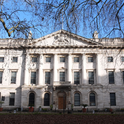Britain has changed: it has become more open and less prejudiced, and it is time that our conversation about race moved on too. Trevor Phillips’s Channel 4 documentary last night, Things We Won't Say About Race That Are True, gave that conversation a big shove in the right direction. It will, I hope, mark a new stage in Britain’s thinking and talking about race.
Generalising about the behaviour patterns of different ethnic groups—even when based on solid facts—is often problematic. The sensitivity arises in part from the history of racial stereotyping and derogatory generalisations about minorities that were still commonplace three decades ago.
But as Phillips said the facts themselves can never be bigoted—that young black males are more likely to commit some kinds of crime than other people, or that Jewish households in Britain are on average twice as wealthy as the rest—it is only racialised, ahistorical explanations of these patterns that can reflect bigotry.
Surely, we are now grown up enough as a society to deal in facts, to talk about race in the same way that we talk about social class. Race and ethnicity is more sensitive than class because of the recent history of racism but both are similarly big factors in shaping an individual’s worldview and life chances.
Of course, everyone is an individual; ethno-cultural background is not destiny and many people float free from their roots. But, as we are all aware, there is such a thing as society and that society is in part made up of groups.
Modern liberals are often uneasy about group allegiances: “What's the fuss, we are all just individuals aren't we?" But these allegiances remain strong. The idea of multiculturalism is partly premised on the importance of cultural traditions to people.
To give a simple example relating to differences in ethnic minority social mobility in Britain: people of East African Asian background invariably go to good universities and into well paid professional jobs and people of Kashmiri Pakistani background, whose families have usually been in Britain longer, are often still driving taxis or working in restaurants. This is neither a mass coincidence nor is it to do with genes or race, it is rather to do with different cultural habits and different starting points; East African Asians had many linguistic and educational advantage over Kashmiri Pakistanis when they began arriving in the late 1960s.
Phillips argues in the programme that it is not just in the interests of truth to talk about these things but in the interests of minorities themselves. Just as analysis of the large differences in educational outcomes relating to social class has led to policies to remedy the situation (such as the pupil premium which gives extra funds to boost the performance of disadvantaged kids), so the same can be true of particular patterns of minority failure.
As Phillips shows, not talking about minority problems, such as the recent sexual grooming cases by mainly British Pakistani men in Oxford and Rotherham, both prevents us dealing with the issue and dangerously widens the gulf between the street conversation about race and the official one.
I became particularly interested in different patterns of minority integration and segregation when writing my book about post-war immigration to Britain, The British Dream. And I launched the Mapping Integration unit at the think tank Demos (with the help of Trevor Phillips) in order to make well-grounded generalisations about integration/segregation, and the different patterns of minority life that have a bearing on it, as commonplace as discussions of social class.
We need to improve our minority “literacy” in order to better understand the successes and failures of integration.
The large scale immigration of the past 15 years coming on top of the post-colonial immigration of the 1950s to 1990s has left us with a complex combination of clustering and mixing—across residency, schooling, work and leisure. The ability of a society to comfortably absorb newcomers becomes both more important and more difficult when the flows are high and rapid.
The actual integration story in Britain is varied. On the one hand there is a story of declining discrimination, an increase in mixed race children, upwardly mobile minorities and unselfconsciously mixed suburbs. But elsewhere there is also a story of white (and brown) exit and parallel lives—and what the political scientist and Harvard professor Robert Putnam has called “hunkering down”—especially in parts of the north of England. Most people from the white British majority do not like the idea of becoming a minority in any given area, this has led to almost half of the non-white ethnic minority population of Britain living in wards that are less than 50 per cent white British. Is that too much ethnic clustering for a good society?
There is no clear answer to that question. But we know so much about the new patterns of life in Britain that ignorance of the trends themselves is inexcusable. And as the ethnic minority population (including white minorities) of England and Wales has surged ahead from around 7 per cent in the mid-1990s to over 20 per cent just two decades later, our knowledge of patterns of clustering and dispersal in housing, jobs, schooling and so on is surely of enormous value to politicians and policy makers.
There are no simple answers to the conundrums of integration and segregation: minority success for example does not always lead to a higher level of integration, successful south Asians generally live more separately than less successful African-Caribbeans. Moreover, disagreement exists not only about the main obstacles to integration—crudely, how much is due to racism/poverty and how much to the internal cultures of minority groups—but also about what an integrated society looks like.
On the other hand most people accept the desirability of some convergence in social and economic outcomes and in everyday norms and understandings, and therefore the need for reliable knowledge about these trends.
Modern colour-blind liberalism demands, rightly, that everyone be treated the same; but that does not mean that everyone is the same. And that raises issues about how we live together: about contact, trust and familiarity, about areas people feel comfortable living in and areas they don't, schools they are happy to send their children to and those they are not.
Trevor Phillips’s documentary, in making the case for more knowledge and less emotion when it comes to talking about race, will help to make Britain a more honest and a fairer place.
It's time for a more honest approach to race
Trevor Phillips’s documentary on ethnicity exposes the need for a more open dialogue
March 20, 2015

Trevor Phillip's controversial film about multiculturalism probes British attitudes to multiculturalism ©Dominic Lipinski/PA Wire












